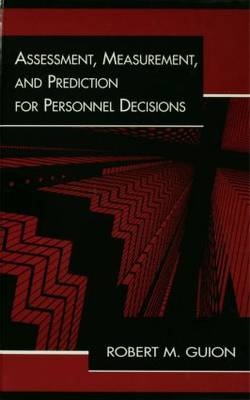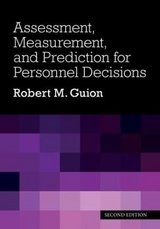
Assessment, Measurement, and Prediction for Personnel Decisions
Seiten
1997
Lawrence Erlbaum Associates Inc (Verlag)
978-0-8058-1577-1 (ISBN)
Lawrence Erlbaum Associates Inc (Verlag)
978-0-8058-1577-1 (ISBN)
- Titel erscheint in neuer Auflage
- Artikel merken
Zu diesem Artikel existiert eine Nachauflage
A practical view of assessment-based personnel decisions is offered with this book. The author argues that decisions about people in organizations are properly based on predictions, literal or implicit, about their probable contributions to the organization.
This book offers a comprehensive and practical view of assessment-based personnel decisions not available elsewhere in a single source. The author believes that:
*decisions about people in organizations--initial selection, promotion, assignment to special training--are properly based on predictions, literal or implicit, about their probable contributions to the organization;
*good prediction requires well-formed hypotheses about personal characteristics that might be related to valued behavior at work;
*these characteristics should be carefully assessed; and
*the assessments and their use should be thoroughly evaluated.
Guion also notes that, in his view, the field of assessment-based personnel selection (a prototypical personnel decision) seems not to have fully acknowledged changing situations, methods, and theories of measurement. Too often, hypotheses basic to personnel decisions have been limited by traditionally-used procedures for data collection and analysis.
To evaluate assessment or measurement, most personnel selection literature emphasizes evidence of validity in the form of a "psychometric trinity" of mainly correlations describing criterion-related validity with occasional mention of content or construct validity. Typically, chapters on reliability and validity are different, even independent. In this book, evaluation combines them, presenting a variety of questions about the characteristic to be assessed and its definition, the care and thought used in developing a procedure for assessing it, the extent and nature of measurement errors, the defensibility of intended interpretations of scores, and evidence that the scores are related to jobs and organizational needs. Available books and articles tend to focus narrowly on particular methods of assessment (tests, interviews, or assessment centers), research methods (correlational), or problems (legally-defined fairness). Work, the labor market, organizations, and psychometric technology and theory have changed. These changes both permit and require some changes in the kinds of research hypotheses put forward for assessments and decisions. A broader, more comprehensive integrated approach to assessment-based decisions, encompassing both traditions and new ideas is needed--and provided by this book.
This book offers a comprehensive and practical view of assessment-based personnel decisions not available elsewhere in a single source. The author believes that:
*decisions about people in organizations--initial selection, promotion, assignment to special training--are properly based on predictions, literal or implicit, about their probable contributions to the organization;
*good prediction requires well-formed hypotheses about personal characteristics that might be related to valued behavior at work;
*these characteristics should be carefully assessed; and
*the assessments and their use should be thoroughly evaluated.
Guion also notes that, in his view, the field of assessment-based personnel selection (a prototypical personnel decision) seems not to have fully acknowledged changing situations, methods, and theories of measurement. Too often, hypotheses basic to personnel decisions have been limited by traditionally-used procedures for data collection and analysis.
To evaluate assessment or measurement, most personnel selection literature emphasizes evidence of validity in the form of a "psychometric trinity" of mainly correlations describing criterion-related validity with occasional mention of content or construct validity. Typically, chapters on reliability and validity are different, even independent. In this book, evaluation combines them, presenting a variety of questions about the characteristic to be assessed and its definition, the care and thought used in developing a procedure for assessing it, the extent and nature of measurement errors, the defensibility of intended interpretations of scores, and evidence that the scores are related to jobs and organizational needs. Available books and articles tend to focus narrowly on particular methods of assessment (tests, interviews, or assessment centers), research methods (correlational), or problems (legally-defined fairness). Work, the labor market, organizations, and psychometric technology and theory have changed. These changes both permit and require some changes in the kinds of research hypotheses put forward for assessments and decisions. A broader, more comprehensive integrated approach to assessment-based decisions, encompassing both traditions and new ideas is needed--and provided by this book.
Contents: Preface. Foreword. Part I: Foundations for Personnel Decisions. Membership Decisions in Organizations. Analysis of Selection Problems. Developing the Predictive Hypothesis. The Legal Context for Personnel Decisions. Part II: Evaluation of Assessment Procedures. Basic Concepts in Measurement. Further Concepts in Measurement. Bivariate Prediction of Performance. The Use of Multivariate Statistics. Judgment in the Prediction of Performance. Analysis of Bias. Part III: Methods of Assessment. Assessment by Testing. Assessment by Ratings. Assessment by Inventories and Interviews. Multiple Assessment Procedures.
| Erscheint lt. Verlag | 12.11.1997 |
|---|---|
| Verlagsort | Mahwah |
| Sprache | englisch |
| Maße | 152 x 229 mm |
| Gewicht | 1429 g |
| Themenwelt | Wirtschaft ► Betriebswirtschaft / Management ► Personalwesen |
| ISBN-10 | 0-8058-1577-5 / 0805815775 |
| ISBN-13 | 978-0-8058-1577-1 / 9780805815771 |
| Zustand | Neuware |
| Informationen gemäß Produktsicherheitsverordnung (GPSR) | |
| Haben Sie eine Frage zum Produkt? |
Mehr entdecken
aus dem Bereich
aus dem Bereich
wie wir Arbeit (wieder) lieben lernen
Buch | Softcover (2024)
Vahlen (Verlag)
24,90 €
ein transformativer Ansatz für die Resilienz von Führungskräften, …
Buch | Softcover (2024)
Vahlen (Verlag)
36,90 €



